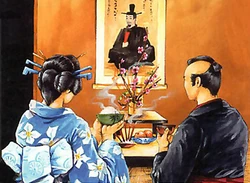
Ancestor worship
The reverence and worship of departed ancestors is the oldest form of religion in Rokugan. It is believed that after death, the spirits of the departed live on in one of several Spirit Realms, and that they can see and even interact with their descendants still alive in Ningen-do, especially those who have entered Yomi -- Realm of the Blessed Ancestors. These spirits can offer aid in the way of blessings or advice, or offer correction in the form of haunting. People offer gifts of food, prayer, and incense to their ancestors, either as thanks for their aid or appeasement from their haunting.
Organization and Beliefs[]
Ancestor worship is a folk religion and as such has no cetralized power structure or dogmatic organization. It is merely a system of beliefs passed down from parent to child throughout the culture.
A family will have a shrine for its own ancestors, but rarely for other families'. Sometimes legendary heroes will have shrines in lands and families not their own. People errect these shrines so that the powerful spirits of these legends will watch over them, their families, and sometimes their villages or towns.
The people of Rokugan are respectful, but uneasy where sprits of the dead are concerned. The sprits are dangerous, but not necessarily evil.
Among the Samurai[]
Samurai seek a lasting relationship with their ancestors. Those among their family who have performed great and heroic deeds are believed to live on in Yomi and watch over their descendants. Good fortune for a samurai comes from a benevolent ancestor, whereas bad fortune obviously comes from a malicious spirit. Samurai are careful to make the proper offerings to their ancestors so that they may stave off their wrath and to help them on their way to their next reincarnation.
Shugenja, especially those of the Kitsu family, are often called to serve as mediums, relaying messages from the living to their ancestors, seeking their advice, and begging them for favors.
Among the Peasantry[]
The peasants of Rokugan have no revered ancestors. They are concerned only with Meido, where their deceased ancestors await reincarnation. They do attribute ill fortune to the presence of vengeful ghosts, so the spirits of the deceased are not generally welcomed by the peasantry. The reverence of ancestors among the heimin is a preventative measure done to stave off ill effects of disgruntled spirits. Peasants honor their oldest known ancestor, their parents, and any spirit that appears and demands inclusion.
To the peasantry, shugenja are most often called for exorcisms. Peasants don't commune with spirits, even revered ones, nor do they seek their guidance. They try merely to appease the spirits, and call for shugenja when disaster strikes.
The Shrine[]
Regardless of caste, every family in Rokugan keeps a shrine to its ancestors. The shrine is very unobtrusive and private, yet easily accessable, often in a corner of the main room of the house. Sometimes the shrine is kept in a cabinet, so that it can be closed off for privacy, and so that it can be easily transported. The shrine's contents are likewise simple, generally consisting of an incense burner, a bowl of rice, possibly a bottle of sake, and the family's ihai. Many of these shrines also contain a small statuette of Shinsei.
Karma and Rebirth[]
Samurai are forced to pay for their actions in this life by returning as samurai in the next.
Karma is believed to be acquired by a person throughout his life for the deeds he does -- good karma for good deeds and bad karma for bad deeds. While a person's karma is believed to affect his life, after his death it has an even greater effect on his reincarnation, as it affects to which of the Spirit Realms his soul will go upon reincarnation. A selfish person may be reborn as a slug into Chikushudo, the realm of animals, to teach him humility, whereas a person who has led a pure life might be reborn into a higher station in Ningen-do (a heimin returning as a samurai, for instance), or he may ascend to Yomi.
The idea of reincarnation is also central to the selflessness required by bushido. If a samurai dies only to return to life again, then there is no great value placed on his current incarnation. This belief allows samurai to charge into battle with little regard for their own well-being, because by following bushido, the samurai ensures himself a better position in his next life.
Meido[]
Emma-o, as the Fortune of Death, and the Shi-Tien Yen-Wang, the Moto Death Gods, are the judges of the deceased who enter Meido, the Realm of Waiting. Their job is to purify the souls of the deceased so they can enter their new lives, or move on to the realms they are meant for. The Fortune and the Lords achieve this by torturing the souls of the deceased until their negative karma is paid for. For the pure, this can mean an instant reincarnation to one of the Spirit Realms, but for the wicked, this may mean a thousand years of pain and waiting.
If asked by their living relatives, Fukurokujin and Jizo will intervene with Emma-o and the Shi-Tien Yen-Wang on behalf of the souls enduring his cleansing. These Fortunes will sometimes gain the deceased a brief break from their tortures or help them receive a better reincarnation once readied.
See also[]
External Links[]
- Ancestral Reverence (Heaven & Earth)
Major References[]
- Way of the Phoenix Pages 32-34.